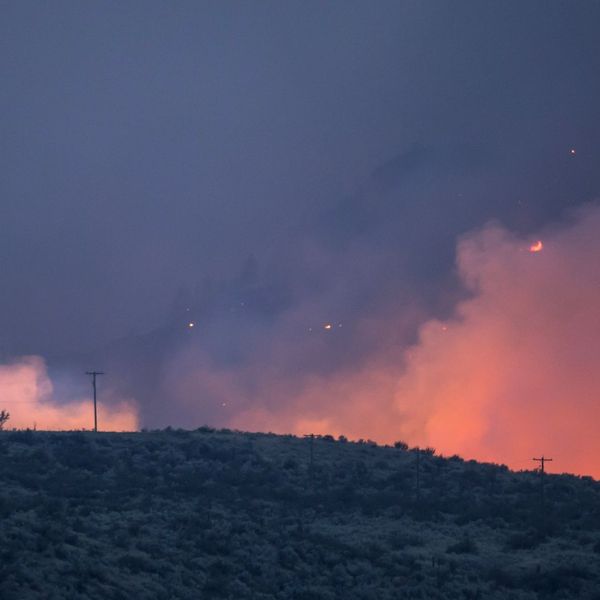
White River, near the location of the proposed rights-of-way. (Photo: Ray Bloxham, Southern Utah Wilderness Alliance)
New Lawsuit Challenges Energy-Intensive 'Disaster for Climate, Wildlife, and Colorado River Basin'
The proposed massive oil shale project would drain more than 3 billion gallons of water per year from the Green River
A coalition of conservation groups filed a legal challenge this week to the Trump administration's approval of what would be the nation's first commercial-scale oil shale mine and processing facility--a fossil fuel project the groups say would run roughshod over the environment.
At issue is Estonia-based Enefit American Oil's strip-mining South Project for eastern Utah's Uinta Basin.
In their lawsuit (pdf) filed Thursday in U.S. District Court in Utah, the organizations say that the administration violated the law in approving several rights of way for utilities across public lands to enable the company to construct and operate its proposed 50,000-barrel-per-day project.
The lawsuit states:
BLM and the U.S. Fish & Wildlife Service (Service) failed to adequately analyze the significant adverse environmental impacts of Enefit's oil shale development. Instead, BLM and the Service only focused on the relatively minimal impacts caused by constructing and maintaining the pipelines, transmission lines, and access road. This impermissibly narrow review violated the National Environmental Policy Act (NEPA) and the Endangered Species Act (ESA), undermined informed decision making and public participation, and failed to prevent harm to imperiled fish and plant species.
"The responsible federal agencies have worn blinders in approving this project, leaving themselves and the public in the dark about the immense ecological harm it would cause," said Alex Hardee, an associate attorney at Earthjustice.
Michael Toll, a staff attorney at Grand Canyon Trust, laid out what the project would entail:
Enefit's South Project would dig up more than 28 million tons of oil shale per year, generating hundreds of millions of tons of waste rock and "overburden"--the industry term for the soils, plants, and layers of rock that lie in the way.
It would also drain more than 3 billion gallons of water per year from the Green River in a region that averages fewer than 10 inches of precipitation annually. The total carbon dioxide emissions of the over 547 million barrels of oil produced over three decades--if you follow the lifecycle of the oil shale from mine to wheel--would be up to 75 percent higher than those of conventional fuels.
The water diversion, the suit adds, "would potentially jeopardize the continued existence of the four fish species and adversely modify their habitat." On top of that threat, "the rights-of-way and Enefit's oil shale operations would destroy a significant portion of the remaining critical habitat for two plant species proposed for listing under the ESA, the Graham's penstemon and White River penstemon."
Despite such threats, the administration greenlighted the rights-of-way--which the groups say are what makes the project feasible--in September.
"We are proud to do our part to move this important energy project forward," BLM deputy director Brian Steed said (pdf) at the time.
Given the project's broad impacts, Ted Zukoski, a senior attorney at the Center for Biological Diversity, called it "a prescription for disaster for our climate, wildlife, and the Colorado River Basin."
Given the climate crisis, said Dan Mayhew, conservation chair of the Utah Chapter of the Sierra Club, it's time to be stepping away from harmful fossil fuel projects.
"We should be accelerating the transition to clean energy," said Mayhew, "not sacrificing our water, air quality, and climate for an investment in one of the dirtiest fossil fuels in the world."
An Urgent Message From Our Co-Founder
Dear Common Dreams reader, The U.S. is on a fast track to authoritarianism like nothing I've ever seen. Meanwhile, corporate news outlets are utterly capitulating to Trump, twisting their coverage to avoid drawing his ire while lining up to stuff cash in his pockets. That's why I believe that Common Dreams is doing the best and most consequential reporting that we've ever done. Our small but mighty team is a progressive reporting powerhouse, covering the news every day that the corporate media never will. Our mission has always been simple: To inform. To inspire. And to ignite change for the common good. Now here's the key piece that I want all our readers to understand: None of this would be possible without your financial support. That's not just some fundraising cliche. It's the absolute and literal truth. We don't accept corporate advertising and never will. We don't have a paywall because we don't think people should be blocked from critical news based on their ability to pay. Everything we do is funded by the donations of readers like you. Will you donate now to help power the nonprofit, independent reporting of Common Dreams? Thank you for being a vital member of our community. Together, we can keep independent journalism alive when it’s needed most. - Craig Brown, Co-founder |
A coalition of conservation groups filed a legal challenge this week to the Trump administration's approval of what would be the nation's first commercial-scale oil shale mine and processing facility--a fossil fuel project the groups say would run roughshod over the environment.
At issue is Estonia-based Enefit American Oil's strip-mining South Project for eastern Utah's Uinta Basin.
In their lawsuit (pdf) filed Thursday in U.S. District Court in Utah, the organizations say that the administration violated the law in approving several rights of way for utilities across public lands to enable the company to construct and operate its proposed 50,000-barrel-per-day project.
The lawsuit states:
BLM and the U.S. Fish & Wildlife Service (Service) failed to adequately analyze the significant adverse environmental impacts of Enefit's oil shale development. Instead, BLM and the Service only focused on the relatively minimal impacts caused by constructing and maintaining the pipelines, transmission lines, and access road. This impermissibly narrow review violated the National Environmental Policy Act (NEPA) and the Endangered Species Act (ESA), undermined informed decision making and public participation, and failed to prevent harm to imperiled fish and plant species.
"The responsible federal agencies have worn blinders in approving this project, leaving themselves and the public in the dark about the immense ecological harm it would cause," said Alex Hardee, an associate attorney at Earthjustice.
Michael Toll, a staff attorney at Grand Canyon Trust, laid out what the project would entail:
Enefit's South Project would dig up more than 28 million tons of oil shale per year, generating hundreds of millions of tons of waste rock and "overburden"--the industry term for the soils, plants, and layers of rock that lie in the way.
It would also drain more than 3 billion gallons of water per year from the Green River in a region that averages fewer than 10 inches of precipitation annually. The total carbon dioxide emissions of the over 547 million barrels of oil produced over three decades--if you follow the lifecycle of the oil shale from mine to wheel--would be up to 75 percent higher than those of conventional fuels.
The water diversion, the suit adds, "would potentially jeopardize the continued existence of the four fish species and adversely modify their habitat." On top of that threat, "the rights-of-way and Enefit's oil shale operations would destroy a significant portion of the remaining critical habitat for two plant species proposed for listing under the ESA, the Graham's penstemon and White River penstemon."
Despite such threats, the administration greenlighted the rights-of-way--which the groups say are what makes the project feasible--in September.
"We are proud to do our part to move this important energy project forward," BLM deputy director Brian Steed said (pdf) at the time.
Given the project's broad impacts, Ted Zukoski, a senior attorney at the Center for Biological Diversity, called it "a prescription for disaster for our climate, wildlife, and the Colorado River Basin."
Given the climate crisis, said Dan Mayhew, conservation chair of the Utah Chapter of the Sierra Club, it's time to be stepping away from harmful fossil fuel projects.
"We should be accelerating the transition to clean energy," said Mayhew, "not sacrificing our water, air quality, and climate for an investment in one of the dirtiest fossil fuels in the world."
A coalition of conservation groups filed a legal challenge this week to the Trump administration's approval of what would be the nation's first commercial-scale oil shale mine and processing facility--a fossil fuel project the groups say would run roughshod over the environment.
At issue is Estonia-based Enefit American Oil's strip-mining South Project for eastern Utah's Uinta Basin.
In their lawsuit (pdf) filed Thursday in U.S. District Court in Utah, the organizations say that the administration violated the law in approving several rights of way for utilities across public lands to enable the company to construct and operate its proposed 50,000-barrel-per-day project.
The lawsuit states:
BLM and the U.S. Fish & Wildlife Service (Service) failed to adequately analyze the significant adverse environmental impacts of Enefit's oil shale development. Instead, BLM and the Service only focused on the relatively minimal impacts caused by constructing and maintaining the pipelines, transmission lines, and access road. This impermissibly narrow review violated the National Environmental Policy Act (NEPA) and the Endangered Species Act (ESA), undermined informed decision making and public participation, and failed to prevent harm to imperiled fish and plant species.
"The responsible federal agencies have worn blinders in approving this project, leaving themselves and the public in the dark about the immense ecological harm it would cause," said Alex Hardee, an associate attorney at Earthjustice.
Michael Toll, a staff attorney at Grand Canyon Trust, laid out what the project would entail:
Enefit's South Project would dig up more than 28 million tons of oil shale per year, generating hundreds of millions of tons of waste rock and "overburden"--the industry term for the soils, plants, and layers of rock that lie in the way.
It would also drain more than 3 billion gallons of water per year from the Green River in a region that averages fewer than 10 inches of precipitation annually. The total carbon dioxide emissions of the over 547 million barrels of oil produced over three decades--if you follow the lifecycle of the oil shale from mine to wheel--would be up to 75 percent higher than those of conventional fuels.
The water diversion, the suit adds, "would potentially jeopardize the continued existence of the four fish species and adversely modify their habitat." On top of that threat, "the rights-of-way and Enefit's oil shale operations would destroy a significant portion of the remaining critical habitat for two plant species proposed for listing under the ESA, the Graham's penstemon and White River penstemon."
Despite such threats, the administration greenlighted the rights-of-way--which the groups say are what makes the project feasible--in September.
"We are proud to do our part to move this important energy project forward," BLM deputy director Brian Steed said (pdf) at the time.
Given the project's broad impacts, Ted Zukoski, a senior attorney at the Center for Biological Diversity, called it "a prescription for disaster for our climate, wildlife, and the Colorado River Basin."
Given the climate crisis, said Dan Mayhew, conservation chair of the Utah Chapter of the Sierra Club, it's time to be stepping away from harmful fossil fuel projects.
"We should be accelerating the transition to clean energy," said Mayhew, "not sacrificing our water, air quality, and climate for an investment in one of the dirtiest fossil fuels in the world."

